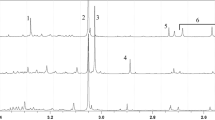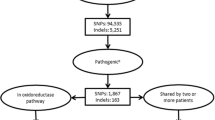Summary
A method potentially of value for investigating putative heterozygotes or carriers of trimethylaminuria by using a single oral dose of trimethylamine (TMA) is described. For healthy volunteers under normal dietary condition and following oral challenge with 300 mg and 600 mg TMA-base, over 90% of the urinary TMA was excreted in the form of TMA (93.6 ± 1.6%). However, at a dose level of 900 mg TMA-base, there was clear evidence of saturation of theN-oxidation reaction as urinary TMA excretion declined to 77.2% (range 74.8–78.9) of the total dose of TMA. By contrast, in pedigree studies based upon propositi with trimethylaminuria, several parents were identified who showed clear evidence of saturation of theN-oxidation of TMA at the 600 mg TMA-base dose level, but not at 300 mg TMA-base or under normal dietary condition. In these individuals, the proportion of urinary TMA as trimethylamineN-oxide (TMAO) declined to (77.3 ± 1.7%). Accordingly we propose that the oral administration of 600 mg TMA-base and the analysis of the following 0–8-h urine collection may be useful for the investigation of possible carriers of trimethylaminuria.
Similar content being viewed by others
References
Al-Waiz, M., Mitchell, S. C., Idle, J. R. and Smith, R. L. The metabolism of14C-labelled trimethylamine and itsN-oxide in man.Xenobiotica 17 (1987a) 551–558
Al-Waiz, M., Ayesh, R., Mitchell, S. C., Idle, J. R. and Smith, R. L. A genetic polymorphism of theN-oxidation of trimethylamine in humans.Clin. Pharmacol. Ther. 42 (1987b) 588–594
Al-Waiz, M., Ayesh, R., Mitchell, S. C., Idle, J. R. and Smith, R. L. Trimethylaminuria (Fish-odour syndrome): a study of an affected family.Clin. Sci. 74 (1988) 231–236
Brewster, H., Schedewie, H. and MacDonald, J. A. Rapid identification of trimethylaminuria as a cause of body odour.Clin. Chem. 26 (1980) 1011
Brewster, M. A. and Schedewie, H. Trimethylaminuria.Ann. Clin. Lab. Sci. 13 (1983) 20–24
De La Huerga, J. and Popper, H. Urinary excretion of choline metabolites following choline administration in normals and patients with hepatobiliary disease.J. Clin. Invest. 30 (1951) 463–470
Humbert, J. R., Hammond, K. B., Hathaway, W. E., Marcoux, J. G. and O'Brien, D. Trimethylaminuria: the fish-odour syndrome.Lancet ii (1970) 770–771
Marks, R., Greaves, M. W., Prottey, C. and Hartrop, P. J. Trimethylaminuria: the use of choline as an aid to diagnosis.Br. J. Dermatol. 96 (1977) 399–402
Prentiss, P. G., Rosen, H., Brown, N., Horwitz, R. E., Malm, O. and Levenson, S. M. The metabolism of choline by the germ free fat.Arch. Biochem. Biophys. 94 (1961) 424–429
Simenhoff, M. L., Dunn, S. R., Asatoor, A. and Milne, M. D. Determination of trimethylamineN-oxide in urine.Proc. Am. Chem. 173 Meeting, 1977, p. 57
Spellacy, E., Watts, W. E., and Goolamali, S. K. Trimethylaminuria.J. Inher. Metab. Dis. 2 (1979) 85–88
Todd, W. A. Psychosocial problems as the major complication of an adolescent with trimethylaminuria.J. Pediatr. 94 (1979) 936–937
Author information
Authors and Affiliations
Rights and permissions
About this article
Cite this article
Al-Waiz, M., Ayesh, R., Mitchell, S.C. et al. Trimethylaminuria: The detection of carriers using a trimethylamine load test. J Inherit Metab Dis 12, 80–85 (1989). https://doi.org/10.1007/BF01805534
Received:
Accepted:
Issue Date:
DOI: https://doi.org/10.1007/BF01805534




